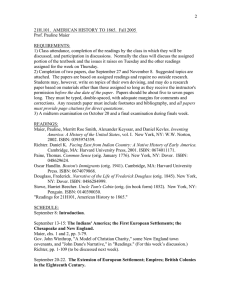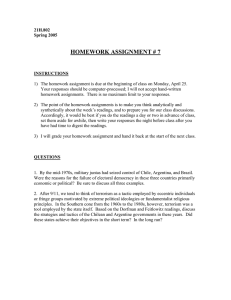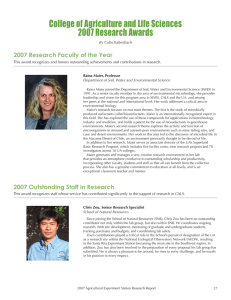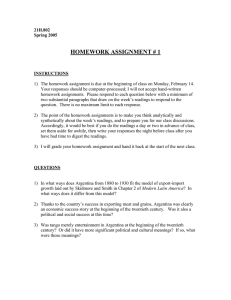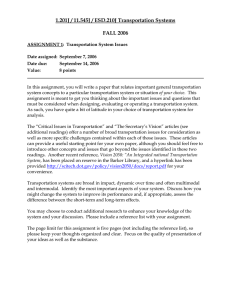21H.101, American History to 1865 2 Prof. Pauline Maier
advertisement
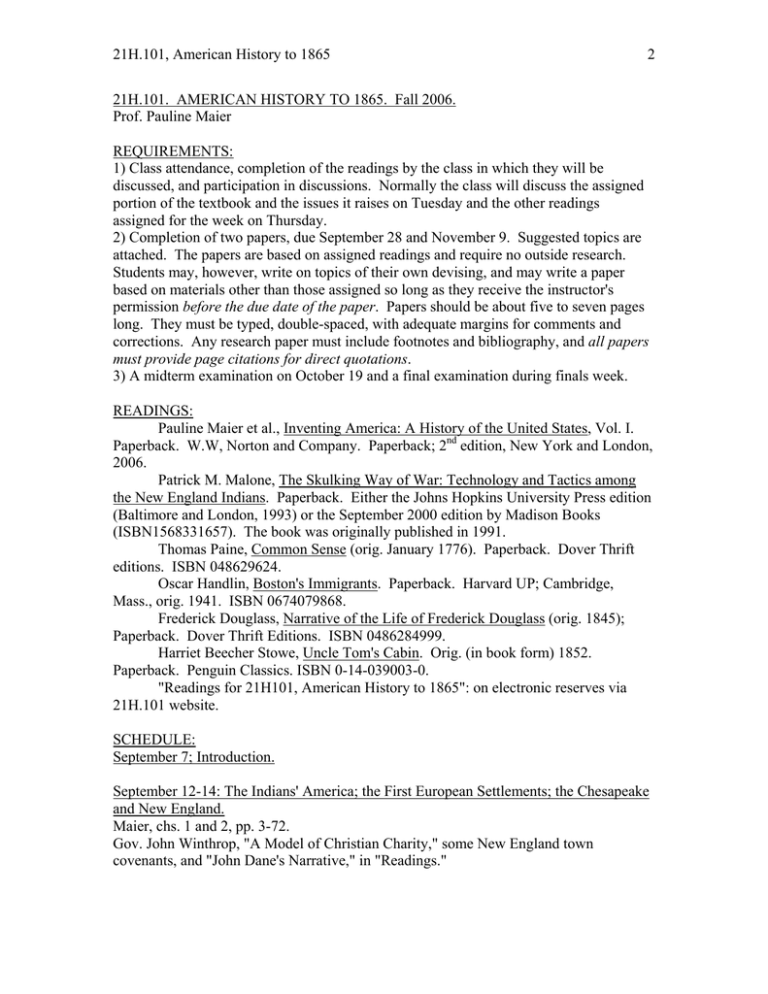
21H.101, American History to 1865 2 21H.101. AMERICAN HISTORY TO 1865. Fall 2006. Prof. Pauline Maier REQUIREMENTS: 1) Class attendance, completion of the readings by the class in which they will be discussed, and participation in discussions. Normally the class will discuss the assigned portion of the textbook and the issues it raises on Tuesday and the other readings assigned for the week on Thursday. 2) Completion of two papers, due September 28 and November 9. Suggested topics are attached. The papers are based on assigned readings and require no outside research. Students may, however, write on topics of their own devising, and may write a paper based on materials other than those assigned so long as they receive the instructor's permission before the due date of the paper. Papers should be about five to seven pages long. They must be typed, double-spaced, with adequate margins for comments and corrections. Any research paper must include footnotes and bibliography, and all papers must provide page citations for direct quotations. 3) A midterm examination on October 19 and a final examination during finals week. READINGS: Pauline Maier et al., Inventing America: A History of the United States, Vol. I. Paperback. W.W, Norton and Company. Paperback; 2nd edition, New York and London, 2006. Patrick M. Malone, The Skulking Way of War: Technology and Tactics among the New England Indians. Paperback. Either the Johns Hopkins University Press edition (Baltimore and London, 1993) or the September 2000 edition by Madison Books (ISBN1568331657). The book was originally published in 1991. Thomas Paine, Common Sense (orig. January 1776). Paperback. Dover Thrift editions. ISBN 048629624. Oscar Handlin, Boston's Immigrants. Paperback. Harvard UP; Cambridge, Mass., orig. 1941. ISBN 0674079868. Frederick Douglass, Narrative of the Life of Frederick Douglass (orig. 1845); Paperback. Dover Thrift Editions. ISBN 0486284999. Harriet Beecher Stowe, Uncle Tom's Cabin. Orig. (in book form) 1852. Paperback. Penguin Classics. ISBN 0-14-039003-0. "Readings for 21H101, American History to 1865": on electronic reserves via 21H.101 website. SCHEDULE: September 7; Introduction. September 12-14: The Indians' America; the First European Settlements; the Chesapeake and New England. Maier, chs. 1 and 2, pp. 3-72. Gov. John Winthrop, "A Model of Christian Charity," some New England town covenants, and "John Dane's Narrative," in "Readings." 21H.101, American History to 1865 3 September 19-21. The Extension of European Settlement; Empires; British Colonies in the Eighteenth Century. Maier et. al., Inventing America, chs. 3 and 4, pp. 73-137. Malone, Skulking Way of War. First paper due September 28. September 26-28. Independence. Maier, ch. 5, pp. 139-174. Paine, Common Sense. Mason draft of the Virginia Declaration of Rights (June 1776) and the draft Declaration of Independence with Congress's editings, in "Readings." October 3-5. The Creation of the American Republic: the States. Maier, ch. 6 and the first part of ch. 7, 175-213. The first state constitutions of Virginia (1776), Pennsylvania (1776), and Massachusetts (1780), in "Readings." The Articles of Confederation, in Maier (appendices). October 10: Columbus Day, Holiday. October 12: Creation of the American Republic: the Nation. Maier, the rest of ch. 7, pp. 213-225. Gov. Edmund Randolph’s speech presenting the Virginia Plan from the Constitutional Convention, May 29, 1787, in “Readings” and also available at: http://www.yale.edu/lawweb/avalon/debates/529.htm The Constitution in Maier (appendices). Excerpt from the Virginia Ratifying Convention; the Virginia and New York instruments of ratification (1788), in “Readings.” October 17. The Nation, Continued; Race and Revolution; Review. Jefferson’s “Query XIV” from Notes on the State of Virginia (1785), in “Readings” and also available at http://etext.lib.virginia.edu/toc/modeng/public/JefBv021.html (Scroll down to the part where Jefferson discusses what he proposes to do with Virginia’s slave population, and why it couldn’t just stay in Virginia.) October 19: Midterm. October 24-26. The Politics of the Early Republic. Maier, chs. 8 and 9, pp. 226-287. Madison's speech in the First Federal Congress, June 8, 1789, proposing amendments to the Constitution and the amendments as they emerged from Congress, in “Readings” and also available at http://www.constitution.org/jm/17890608_removal.htm (You need to go down a bit to get the relevant part of his speech.) The first ten amendments to the Constitution (the “bill of rights”), in Maier (appendices). Start Handlin, Boston’s Immigrants. 21H.101, American History to 1865 4 October 31-November 2. Political and Economic Development. Maier chs. 10 and 12, pp. 289-311, 340-366. Finish Handlin. November 9. Second Paper Due. November 7-9. The "Age of Jackson"; An Age of Reform. Maier chs. 11 and 13, pp. 312-339, 367-393. Documents on Abolitionism in "Readings." Douglass, Narrative of the Life of Frederick Douglass, an American Slave. (96pp) November 14-16. Expansion and Its Consequences. Maier ch. 14, pp. 395-421. George Fitzhugh’s Defense of Slavery, in “Readings.” Start Stowe, Uncle Tom’s Cabin. November 22. “The Little Lady Who Caused This Big War” Maier, pp. 431-432. Finish Stowe. November 23: Thanksgiving, a Holiday. November 29-Dec. 1. The Crisis of the 1850’s; Secession. Maier, the rest of chapter 15, pp. 422-450, and pp. 451-456 of chapter 16. Lincoln, "House Divided" speech, 1858; “Common Sense,” an editorial of September 18, 1860, in the Charleston, S.C., Mercury; South Carolina’s Secession Ordinance, December 21, 1860, and “Declaration of the Immediate Causes Which Induce and Justify the Secession of South Carolina from the Union,” December 24, 1860; Jefferson Davis's farewell speech to the Senate, and Lincoln's first inaugural address, March 4, 1861, in "Readings." (Note: The South Carolina documents and other secession ordinances are available at http://web.archive.org/web/20061204164042/ http://members.aol.com/jfepperson/ordnces.html) December 6-8. The Civil War. Maier, the rest of chapter 16, pp. 456-483. "Abraham Lincoln on Race and Slavery," in "Readings." December 13. Results of the Civil War; Review. Maier, ch. 17, first two sections, pp. 485-502. The 13th, 14th, and 15th Amendments to the Constitution in Maier appendices (and while you're at it take a look at the 11th and 12th amendments, too). 21H.101, American History to 1865 5 SUGGESTED PAPER TOPICS. 1) Write a review of Patrick Malone's Skulking Way of War. The challenge here is to summarize carefully and accurately the book's argument (that is, what point or points the author wanted to make) and then to evaluate that argument. In describing the book, quote critical passages that demonstrate the author's purpose (always providing page citations) to give solidity to your account. Then ask whether the material in the book sustains that argument. If on either major or minor points the book failed to convince you, say that and explain why. In any case, make sure that you understand what the author was attempting to say and describe what he said with scrupulous accuracy. You don't need to agree with everything a book says, but you do need to be exact in describing what it says before criticizing it. 2) The second paper should focus on Oscar Handlin's Boston's Immigrants, which is on immigrants, particularly Irish immigrants, to 19th-century Boston. When first published in 1941, the book was recognized as a pioneering work and it remains the fullest study of its subject. Still, its interpretation---which, in short, sees the Irish as victims of circumstances beyond their control and as a people whose miserable poverty changed Boston for the worse--- is out of step with more recent interpretations of immigrants, which, like interpretations of the enslaved, are much more upbeat. They stress, for example, immigrants' strength in adversity, their creative adaptation to the New World, and their critical contributions to the communities that became their home. Agency is the critical concept today; it implies, in short, that even the most downtrodden had the power to shape (though perhaps not to determine altogether) the circumstances of their lives. Start your paper with a succinct summary of Handlin's argument, citing critical passages to demonstrate his point of view. Then ask if the book includes evidence that might have sustained a more positive interpretation of Boston’s Irish immigrants. Could he have stressed their strength in adversity, their creative adaptation to the strange circumstances in which they found themselves, and their contributions to Boston’s politics, economy, and culture? Or do you think Handlin's view of the Irish is justifiably different from other, more positive interpretations, as described above? If there seems to be adequate evidence in the book for a more positive view of 19th-century Boston's Irish, why might Handlin have taken the position he took? You cannot, of course, be expected to give a definitive answer to that question, but you might speculate a bit. Finally, is the book still worth reading, or should some other book be assigned in its place next year? MIT OpenCourseWare http://ocw.mit.edu 21H.101 American History to 1865 Fall 2010 For information about citing these materials or our Terms of Use, visit: http://ocw.mit.edu/terms.
